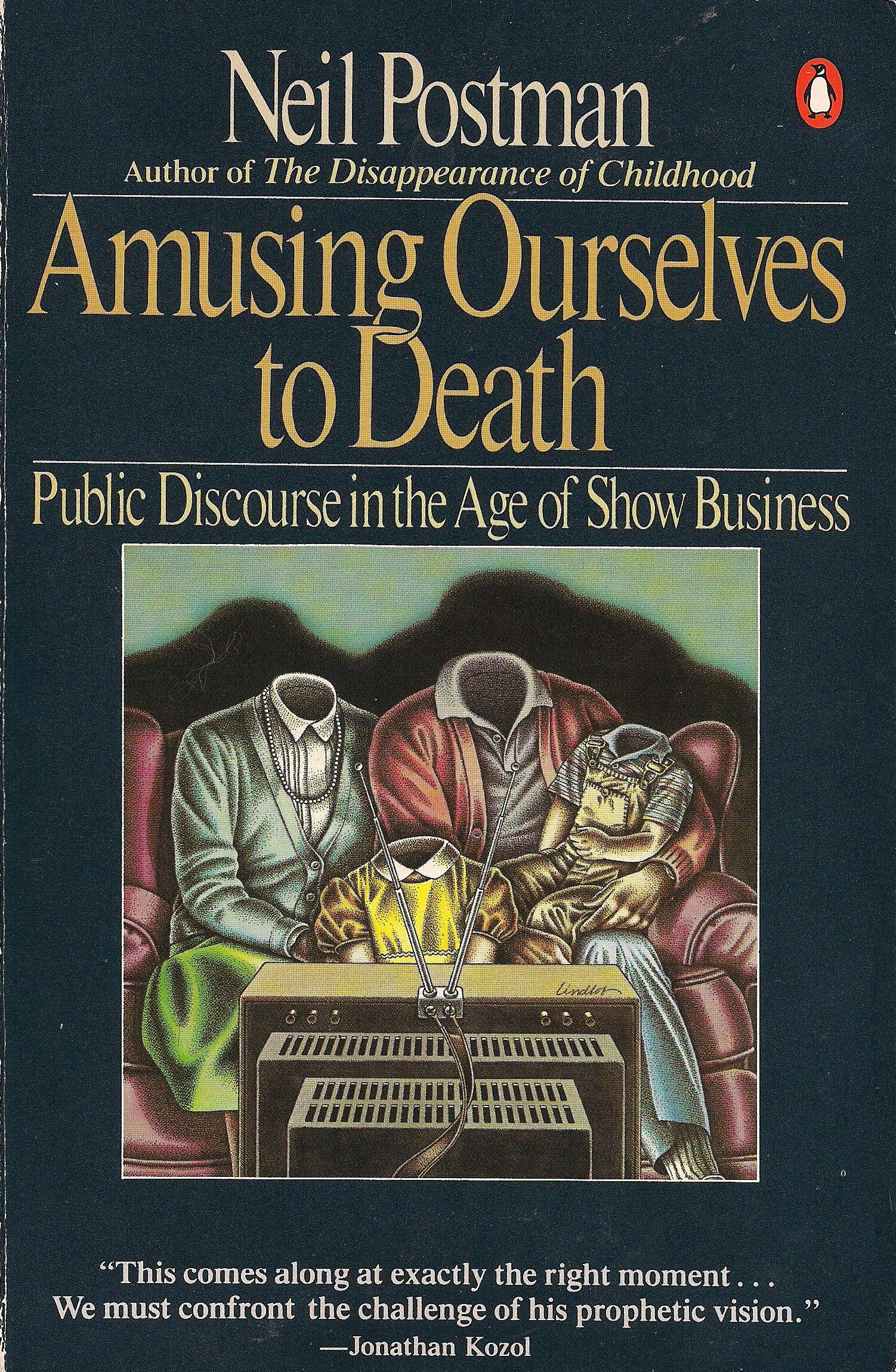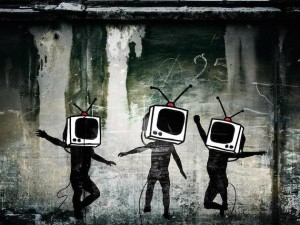Public discourse in the age of show business
by Neil Postman
 If humanity makes the grade in the next few years, a good share of the credit will be due to Professor Neil Postman and his timely insights into the decline of language (esp. with respect to reading and writing), logic, conceptual development, and common sense. In other words, thanks to his framework of astute observations, others may be able to (re)construct the building of our reasoning minds… without which we shall surely go the way of the dodo bird. Amusing Ourselves to Death is arguably the magnum opus of this cultural critic, writer, and communications theorist who was chair of the New York University department of communication arts.
If humanity makes the grade in the next few years, a good share of the credit will be due to Professor Neil Postman and his timely insights into the decline of language (esp. with respect to reading and writing), logic, conceptual development, and common sense. In other words, thanks to his framework of astute observations, others may be able to (re)construct the building of our reasoning minds… without which we shall surely go the way of the dodo bird. Amusing Ourselves to Death is arguably the magnum opus of this cultural critic, writer, and communications theorist who was chair of the New York University department of communication arts.
Two of his other better known books I have reviewed are Technopoly (1991) and Building a Bridge to the 18th Century (1999)—which was his final, comprehensive, and most heartfelt appeal to the ‘better angels of our nature’… particularly the angels who want liberty and literate, benevolent civilization. [A deeply personal note, Building a Bridge was the prize of all the books my dear mother, the accomplished Phyllis Anderson-Barlow-Wright, referred to me—the first to knock me off the ledge of ego where I liked to think “how could Mom know anything really important?”]
Amusing is an earlier, deeper, foundational analysis of how media shape our lives. From the Amazon book description, the book has been “hailed as a twenty-first-century book published in the twentieth century.”
“To say it, then, as plainly as I can, this book is an inquiry into and a lamentation about the most significant American cultural fact of the second half of the twentieth century: the decline of the Age of Typography and the ascendancy of the Age of Television. This change-over has dramatically and irreversibly shifted the content and meaning of political discourse, since two media so vastly different cannot accommodate the same ideas. As the influence of print wanes, the content of politics, religion, education, and anything else that comprises public business must change and be recast in terms that are most suitable to television.” — Page 8
Historical Context
Postman strikes out from the not too distant past. Let me simply think of my grandmother, who was born in Denmark ca. 1900. From an electronic-media standpoint, those days—except for some experimental labs—yet remained in the Vast Era of Silence stretching back to antiquity. In the early 1900s all the sounds around you would have been propagated naturally through the air. If you wanted to hear a church choir or a symphony real time, you had to be there. It wasn’t until the 1920s, after WWI, that commercial radio broadcasting began in earnest… just in time for the central-banks-manufactured Great Depression and Franklin Delano Roosevelt’s soothing words sent out over the airwaves: “Don’t worry, be happy, your kindly, humane federal government won’t let you down.”
A hundred years before that, people also lacked electrical telegraphy and photography (both beginning general commercial use ca. 1830s). Postman points out that from the inception of the United States into the early 1800s, virtually nobody knew what his legislators looked like, much less the governor, president, or ambassador to Slabovia. [Like today, except back then even if you wanted to know, you couldn’t… except by personal contact.]
There’s a page or two where the author describes the 1858 Lincoln-Douglas Senate debates in Illinois, and how they epitomize the typographic way of life: they were highly attended, multihour events, with concessions and other amusements on the grounds. Mainly, they consisted of a structured exchange or dispute of ideas, almost exclusively based on the logic of the written word down to the diagramming of sentences. Compare that to the soundbites, advertising, and image-laden presentations of preselected and packaged candidates for any office in America today.
Information qua Audiovisual Entertainment Displacing Knowledge
That is, the modern world. Postman not only traces the technological and cultural steps leading toward the diminishment of ‘Print’—and all the reading, writing, and wrestling with concept formation that that implies—he nails the thoughtless consequences of that decline squarely on the head. Just one passage to give you an idea of how widely reading and writing (and thinking) by individuals were extolled throughout American society in colonial and post-colonial times:
“… By 1772, Jacob Duché could write: ‘The poorest labourer upon the shore of the Delaware thinks himself entitled to deliver his sentiment in matters of religion or politics with as much freedom as the gentleman or scholar…. Such is the prevailing taste for books of every kind that almost every man is a reader.’
“Where such a keen taste for books prevailed among the general population, we need not be surprised that Thomas Paine’s Common Sense, published on January 10, 1776, sold more than 100,000 copies by March of the same year. [In 1985, a book would have to sell eight million copies (in two months) to match the proportion of the population Paine’s book attracted….” — Page 34
Taking the days of American Independence—with the Declaration and the Constitution, the Federalist Papers, Common Sense, and many other literary achievements—as the full flowering of practical conceptual thought, we can see how far the general population has now fallen into its contrary… what Rand and others have defined as the ’emotional-perceptual’ mode of consciousness.
 Nor has this fall has not escaped the attention of marketeers to and manipulators of… consent. He who has lost his ability to think has lost his ability to be independent, thus is readily moved toward dark ends by those looking for customers and cannon fodder. The following example from Postman’s teaching days illustrates what I have only just recently surmised afflicts (increasingly) younger generations—even among libertarians and Randians—with the disruption of the ability to think in longer terms than a nanosecond:
Nor has this fall has not escaped the attention of marketeers to and manipulators of… consent. He who has lost his ability to think has lost his ability to be independent, thus is readily moved toward dark ends by those looking for customers and cannon fodder. The following example from Postman’s teaching days illustrates what I have only just recently surmised afflicts (increasingly) younger generations—even among libertarians and Randians—with the disruption of the ability to think in longer terms than a nanosecond:
“This point [fragmentation of continuity or context] is nowhere made more clear to me than in conferences with my younger students about their writing. ‘Look here,’ I say. ‘In this paragraph you have said one thing. And in that you have said the opposite. Which is it to be?’ They are polite, and wish to please, but they are as baffled by the question as I am by the response: ‘I know,’ they will say, ‘but that is there and this is here.’ The difference between us is that I assume ‘there’ and ‘here,’ ‘now’ and ‘then,’ one paragraph and the next to be connected, to be continuous, to be part of the same coherent world of thought…. But they are coming from a different [non-Typographic] universe of discourse altogether: the ‘Now… this’ world of television.” — Page 109
The ramifications of Television Epistemology are almost too frightening to investigate or analyze, much less discuss reasonably. Postman does a fine job of outlining the causes, the general problems of it. [Which are today the same only more so, magnified by mobile image-generation-and-manipulation devices and applications.] I, myself, have stepped onto the threshold of an ‘anti-deception’ Grand Cause—refer to it now as Project Toto and Subs—which serendipitously may substantially augment some of the, I must say, rather halfhearted palliatives Mr. Postman offers.
The Prescription
Pure Postman… and why he’s one of the most entertaining and edifying writers I know:
“Thus, there are near insurmountable difficulties for anyone who has written such a book as this, and who wishes to end it with some remedies for the affliction. In the first place, not everyone believes a cure is needed, and in the second, there probably isn’t any. But as a true-blue American who has imbibed the unshakable belief that where there is a problem there must be a solution. I shall conclude with the following suggestions….
“I am particularly fond of John Lindsay’s suggestion that political commercials be banned from television as we now ban cigarette and liquor commercials…. To those who would oppose my testimony by claiming that such a ban is a clear violation of the First Amendment, I would offer a compromise: Require all political commercials to be preceded by a short statement to the effect that common sense has determined that watching political commercials is hazardous to the intellectual health of the community.” — Page 159
Amusing Ourselves To Death is a classic book of cultural commentary whose analyses of the problem(s) bear the seeds of the solution(s). Plus, if intelligence expressed in the simplest and most humane terms is your thing, welcome to the works of Oracle Neil.
This post has been read 2822 times!

